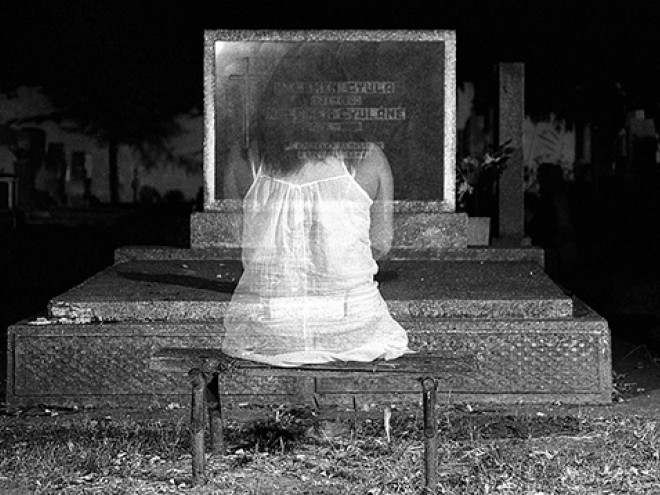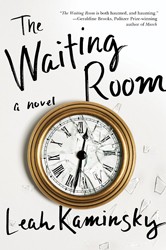Earlier this week, Leah Kaminsky considered the power of inanimate objects and speaking to ghosts in contemporary literature—as in her own novel, The Waiting Room. Leah has been guest blogging for the Jewish Book Council all week as part of the Visiting Scribe series here on The ProsenPeople.
I hate waiting. I’m that person at checkout in the supermarket who hops from line to line impatiently, emerging at the other end eventually, having taken twice as long to get through. If my dentist is running more than fifteen minutes late, I pace around glowering at the poor receptionist, silently furious that no one called me to say he was behind schedule. I get annoyed if my flight has been delayed, resorting to Twitter to vent my frustration against the airline. I can never understand how the people around me appear so calm, lounging around on chairs, deeply engrossed in reading a book, or phlegmatically playing Candy Crush on their phone. If the postponement of gratification is a sign of maturity, then when it comes to waiting I am that toddler in the aisle having a meltdown. Not only do I hate having my time sucked from me, but the demoralizing uncertainty of not knowing how long I will need to wait has me on shpilkes.
How ironic then that someone as impatient as I should take ten (make that thirty) years to write her debut novel. I have imbued my main character, Dina, with my own traits of waiting-angst. She is an ex-pat who visits Israel on a whim: “As soon as she set foot in Ben Gurion airport for the first time, she felt oddly enfolded in familiarity… the line inside passport control reminded her of a crowd of Melbourne Jews waiting for bagels at Glicks Bakery on Carlisle Street every Sunday morning; not really a line, more a schmear of generic impatience.” She fantasizes about having “plastic strap-on elbows to push her way through the strangely endearing organized chaos.” She falls in love, and ends up staying.
The Waiting Room resisted being corralled inside the confines of a book jacket for a very long time. The idea for the novel came to me soon after my mother died. I wanted to write about her extraordinary experiences as a survivor of Bergen-Belsen. She was twenty-one years old when she was liberated, the sole survivor of her entire family. Arriving in Australia as a refugee, she went on to rebuild her life, working, marrying, and raising a family, wrapping us all in a protective shield of love. Yet when I started writing about her after her death, much to my shame, I could only remember snippets of her stories. I had been a reluctant listener as a teenager, running from her haunted past.
It took almost twenty years before I had the courage to tackle the book again. I was already a doctor; I had met my husband and moved to Israel, where we were bringing up three young children. As I struggled to adjust to my new home, a new language, and the demands of day-to-day life, the only writing I managed was scribbling notes in a journal. Many of these observations would become the bedrock from which my novel sprouted — still inspired by my mother’s story, but also by my new experiences as an immigrant.
After a few years I had a pile of scenes, but no overarching narrative or structure to pin them on. Being such an impatient person, I began to feel very frustrated. I met the wonderful author David Grossman after reading his powerful novel See Under: Love. I shared my angst about the book with him. He explained that when he sets out to write a novel he knows almost nothing about it and it is only in the final stages that the story starts to congeal. “I need the story to surprise me, betray me, take me to places I’m afraid to go usually,” he said. In his experience, a novel-in-progress often behaves like a cunning carpet-merchant: “It unrolls and unfolds dozens of colorful carpets, and I’m tempted very easily.”
Grossman’s process intrigued me. At the time, though, I did not realize that I am also the sort of writer who needs to write in order to find out what I am writing, so The Waiting Room limped along at a painstakingly slow pace.
 “Writing is like driving at night in the fog. You can only see as far as your headlights, but you can make the whole trip that way,” E.L. Doctorow once wrote. I persevered in my writing, trying out various structures, but was still totally lost in the narrative woods. The story spanned three continents, three eras, and had a dozen characters. Just as I was ready to give up, a friend encouraged me to apply for an MFA at the Vermont College of Fine Arts. I was paired with an advisor in the second half of the program, Clint McCown, who was a brilliant, softly spoken Southern writer. He accurately diagnosed me of a “fear of finishing” — this novel had been with me for so many years that I almost didn’t want to let go of it. McCown soon became the perfect antidote to my angst-ridden, impatient inner critic, and I started to find my writing mojo again. He encouraged me to develop the ghostly presence of my protagonist’s mother, who eventually grew into a major character in the novel. From there, it didn’t take long then to tame the manuscript into the shape of a novel. After another year of careful editing, under the guidance of my American agent Todd Shuster, I finally felt ready to show it to publishers. Then, within a couple of weeks, after all those years as a work-in-progress, The Waiting Room finally found a home. The wait was finally over.
“Writing is like driving at night in the fog. You can only see as far as your headlights, but you can make the whole trip that way,” E.L. Doctorow once wrote. I persevered in my writing, trying out various structures, but was still totally lost in the narrative woods. The story spanned three continents, three eras, and had a dozen characters. Just as I was ready to give up, a friend encouraged me to apply for an MFA at the Vermont College of Fine Arts. I was paired with an advisor in the second half of the program, Clint McCown, who was a brilliant, softly spoken Southern writer. He accurately diagnosed me of a “fear of finishing” — this novel had been with me for so many years that I almost didn’t want to let go of it. McCown soon became the perfect antidote to my angst-ridden, impatient inner critic, and I started to find my writing mojo again. He encouraged me to develop the ghostly presence of my protagonist’s mother, who eventually grew into a major character in the novel. From there, it didn’t take long then to tame the manuscript into the shape of a novel. After another year of careful editing, under the guidance of my American agent Todd Shuster, I finally felt ready to show it to publishers. Then, within a couple of weeks, after all those years as a work-in-progress, The Waiting Room finally found a home. The wait was finally over.
Leah Kaminsky is a physician and author, whose books include We’re All Going to Die, Writer MD, and Cracking the Code. She is the poetry editor for the Medical Journal of Australia.
Related Content:
- Marjorie Ingall: Uh, Five Reasons My Book Was a Year Late
- Lenore Weiss: How Long Did He Stand Alone?
- Sophie Cook: Heirlooms from Hungary
Leah Kaminsky, physician and award-winning author, is Poetry Editor at the Medical Journal of Australia. Her books include We’re All Going to Die, Writer MD, and Cracking the Code. She holds an MFA in Fiction from Vermont College of Fine Arts.




